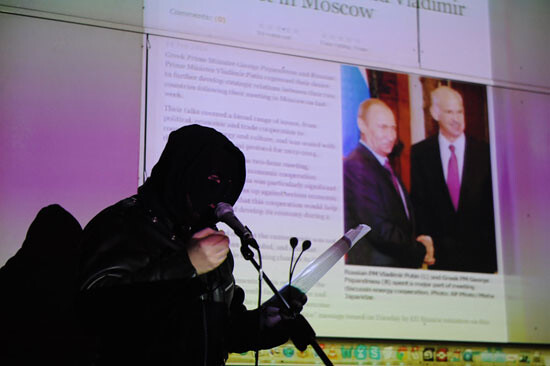With his statement that “Eurozone voters have been blackmailed and betrayed,” journalist and economist Philippe Legrain provided us with a concise account of the political situation in Europe a week before the May 2014 European elections.1 Legrain’s article suggests a direct link between the mismanagement of the sovereign debt crisis on the level of political discourse, and the rise of both xenophobia and Euroscepticism across the continent.2 On a political and economic level, certainly the actual crisis management in Europe has failed to match up to the often contradictory rhetoric of political agents. However, some conclusions can be drawn regarding the ideological foundation of such rhetoric.
In reference to the Maastricht Treaty of 1992, which led to the creation of the euro as a common currency, French economist, writer, and senior civil servant Jacques Attali (a former government adviser and the first president of the European Bank for Reconstruction and Development) declared in a lecture about the European crisis on February 24, 2011 that making things more difficult within the treaty and less democratic for the member-states was in fact the absolute warranty for obliging every single member-state to continue being one. Attali implied that even if the European sovereign debt crisis had not been designed for this purpose, it was at the very least fomented with the aim of forcing a dubious unification process. According to an article published by The Press Project about former US treasury secretary Timothy Geithner’s new book Stress Test (2014), “in 2012 German finance minister Wolfgang Schaeuble presented [Geithner] with a plan to kick Greece out of the eurozone. This, he said, would appease German voters and terrify Europe.” This was the so-called Grexit Plan. The article continues: “According to Schauble’s logic, a Greek exit would scare the rest of Europe enough for them to commit to providing sufficient financial assistance in order to prevent the system from collapsing.”3 A sovereign debt crisis has been deployed as a Trojan horse, not in order to advance a democratic process of integrating Europe politically, legally, economically, and culturally, but rather to create a powerful financial confederation entirely disjoined from national parliaments and democratic decision-making. And indeed, the European Stability Mechanism—the mechanism for managing financial crises in Europe—is under no juridical or parliamentary control, being bound instead to global casino capitalism. In his 2008 book La crise, et après?, Attali advocated a world government as a response to the problems that have emerged from what Richard Falk calls “predatory globalization.”4 In outlining this center-left, utopian vision for a global federation (much like the politically optimistic fiction of global governance suggested in Star Trek), Attali doesn’t discuss the means for achieving such a noble goal. Along the same lines, Robert Cooper, an EU diplomat and a former adviser to UK prime minister Tony Blair, terms this global government a “post-modern cooperative imperium.”5


What all these approaches have in common is an indirect acknowledgement that democratic values and parliamentarianism are indeed in crisis. It is a crisis of how we understand and define the democratic heritage of which Europe is so proud. In November 2013, Roman Herzog, the former president of Germany, declared that the source of democracy in Europe is not classical Athens but Britain and Switzerland.6 Although this statement might have offended philhellenes everywhere, it is a historical fact, analyzed by philosopher Giorgio Agamben. Agamben investigates the ways that power in the West, beginning with the first Christian Roman emperors, has tended to take the form of a divine oikonomia, that is, the dissemination of God’s will into the factual world.7 European politics is the outcome of the theological and political concept of the distribution of divine grace in the world (best exemplified by the British tradition of the “sovereign Dei Gratia”) as well as its continuation in the current form of European governance, which philosopher Alain Badiou calls “parliamentarian capitalism.” (Before Badiou, the great realist novelist Stendhal in 1830 called it “congregational bureaucracy.”8) A devoted evangelical, Roman Herzog’s views on the cradle of European democracy can be traced back to the Calvinist secular ethic, which, as Max Weber analyzed in his classical study The Protestant Ethic and the Spirit of Capitalism, shaped the current sociopolitical order of engaging in trade and accumulating wealth for investment.
Herzog’s argumentation introduces a fundamental question concerning Europe’s present and future. And by “Europe” we are not simply referring to current European politics, or even to the European Union, but to Europe as an entity with a distinctive set of political, cultural, and social norms, values, and histories—which clearly go beyond any banal symbols such as the Eurovision Song Contest, InterRail, or a common design for EU passports. These fundamental values—such as connectivity, solidarity, and a respect for human rights, which, according to economic and social theorist Jeremy Rifkin, contribute to the European dream—shape a powerful political imaginary.9
Even if, as Agamben puts it, the theological-political concept of oikonomia is at the heart of the intertwining of the political and the economic, we shouldn’t forget that when it comes to establishing a genealogy of European democracy, the Greek answer to the fundamental question of how to understand the world is of an entirely different nature. It is best articulated in the third play of Aeschylus’s trilogy The Oresteia. Here, the hero Orestes appeals to the goddess Athena for help in solving an ethical and political dilemma: Do mortals comply with the ethical demands and primordial norms of the ancient race of the gods, or with the laws of the Olympians? Athena then does something no one has ever thought of before: she establishes a public court composed of the city’s people. No god or any other outside authority will offer the answer—only the public court. Athena the goddess becomes Athena the polis. Here is the birth of democracy, in Athens in the fifth century BCE—the earliest known direct democracy in history, opposed to the Judeo-Christian (and Muslim) conception of an eternal law according to which man is subject to the will of God.


It is this political form of ancient Athens which, according to philosopher Cornelius Castoriadis, established the model of an autonomous society. This model is indeed far removed from Imperial Roman, the theocratic Middle Ages, the absolutist Baroque period, and the colonial Victorian age—world orders which still seem to direct the ideologies and beliefs of today’s politicians. European policymakers cannot be accused of lacking historical knowledge or sophistication (as Herzog’s statement indicates). However, many European citizens accuse them of lacking a progressive vision that could implement far-reaching changes to the reigning parliamentarian capitalism. Castoriadis terms this potential for autonomy and creativity “the creative imaginary,” and he calls the enslaving and regressive forces of capitalism “the capitalist imaginary.”10 Capitalism has introduced the fiction of instrumentalist reason as modern society’s foundation, in order to put aside the foundational societal imaginaries expressed through various creation myths. Both constitute what Castoriadis calls the “imaginary institution of societies,” that is, formative ideologies of the world and humans’ place in it.
However, the dubious mixture of instrumentalist reason and residues of archaic thinking gives rise to movements which present us with a fiction of unity and solidarity based on “imaginary” identities, whether racial, ethnic, or linguistic. The semblance of harmony proposed by these movements—that is, the pseudo-religious and populist salvationist visions of escape, order, and perfectibility (how different are such conceptions from eighteenth-century enlightenment or nineteenth-century social thinking?)—brings to the fore the crisis of modern democracy. Indeed, the rise in recent years of right-wing ultranationalist and identitarian movements, which generally criticize and oppose the condition of the contemporary West while proposing the preservation of an ethnic and cultural identity based on specific geographies, is a result of the failure of the capitalist imaginary to hold its position as globalized society’s founding narrative. We shouldn’t regard such movements as simply an expression of resentment over the poor performance and mismanagement of policymakers, but rather as a systemic failure of the ideology such policymakers espouse.
For instance, it is generally accepted that the emergence Los Indignados in Greece, provoked by austerity measures in Southern Europe, has both radicalized leftist and autonomist movements, and also give momentum to so-called Third Position groups, ranging from right-wing autonomist nationalists to revolutionary national anarchists. As political theorist Kostis Stafylakis maintains, we are dealing with “a new ideological spectrum” and “unpredictable rearticulations that have taken place in the camps of both the Left and the Right.”11 Political scientists often maintain that Third Positionism is, in fact, an ideological mutation of the neo-fascist right. However, monstrous neofascist parties such as Golden Dawn in Greece are better understood as representing the reverse facet—the populist disguise—of mainstream neoliberal ideology.12
The metapolitical, post-democratic administration of European societies has facilitated the hegemony of the populist Right by failing to appeal to low- and middle-class strata across the European continent. Conservative populists, right-wing parliamentary coalitions, and ideologues from the late-’70s culturalist Right (leftovers of the Nouvelle Droite) have won the battle for ideological hegemony by addressing the “passions” of recently proletarianized and even lumpenized social strata.13


However, ultranationalist and identitarian movements cannot be sufficiently explained by the otherwise valuable theoretical approach of “post-democracy,” that is, a wave of depoliticization that entails a refusal by citizens to participate in democratic processes as a reaction to feeling disrespected by the state and their representatives.14 These movements also embody a deeply rooted and regressive “palingenetic myth,” which, under circumstances of economic and social stability, remains inactive.15 The systemic failures of globalized capitalism—not only its economic and social disasters, but also the inadequacy of its public rhetoric and the absence of any far-reaching political vision—disclose the system’s foundation: a belief in technological rationalism and inevitable progress. In doing so, they make its imaginary vulnerable to all kinds of simplistic going-back-to-the-roots tactics and interpretations. It can be argued that attitudes such as xenophobia, anti-Semitism, anti-feminism, anti-immigrant hate, and homophobia formulate an imaginary identity on the basis of opposing the Other. In studying the above symptoms of the political, Lacanian political theory has introduced the idea that “the Other wants to steal from us our precious enjoyment.”16 In this regard, these regressive states, which come to the fore when the capitalist narrative of social progress is disrupted, represent various stages of foreclosure within the “capitalist imaginary.” Ultranationalist and identitarian movements constitute the nightmare of the capitalist imaginary, which will hopefully force European society to wake up and embrace its creative double.
One of the main goals of both progressive political discourse and interventionist art should be to reveal the hidden ideologies of such movements, instead of embracing an undifferentiated, wishful-thinking rhetoric of trivial enlightenment and benevolent altruistic commitment.17
Philippe Legrain, “Eurozone voters have been blackmailed and betrayed. No wonder they’re angry,” The Guardian, May 15, 2014
“The European Union was often unpopular even before the financial crisis. But the long slump and eurozone policymakers’ blunders have created a political firestorm. Support for the EU has plunged to all-time lows. Most Europeans now associate it with austerity, recession and German domination, with constraints on what they can do, rather than on how we can achieve more together. Anti-EU parties, often xenophobic and comprising reactionary extremists, are set to do well in next week’s European elections. … The crisis has shredded trust in mainstream politicians’ competence and motives. They failed to prevent the crisis and have proved incapable of resolving it. They bailed out banks and their creditors while slashing spending on poor schoolchildren. They inflict suffering on others, while remaining largely unscathed themselves. No wonder voters are angry.”
“Timothy Geithner reveals Schauble’s plan to kick Greece out of the euro and ‘terrify’ the rest of Europe,” The Press Project, May 14, 2014 →.
Richard Falk, Predatory Globalization: A Critique(Cambridge: Polity, 1999).
Robert Cooper, The Breaking of Nations: Order and Chaos in the Twenty-first Century (New York: Grove Press, 2004).
Roman Herzog, “Man muss die AfD ernst nehmen,”Handelsblatt, Nov. 21, 2013.
Giorgio Agamben, The Kingdom and the Glory: For a Theological Genealogy of Economy and Government, trans. Lorenzo Chiesa and Matteo Mandarini (Stanford: Stanford University Press, 2011).
Jacques Rancière, Aisthesis: Scenes from the Aesthetic Regime of Art, trans. Zakir Paul (London: Verso, 2013), 42.
Jeremy Rifkin, The European Dream: How Europe’s Vision of the Future Is Quietly Eclipsing the American Dream (London: Polity Press, 2004).
Cornelius Castoriadis, “Imaginary and Imagination at the Crossroads,” in Figures of the Thinkable, trans. Helen Arnold (Stanford: Stanford University Press, 2007), 146.
Kostis Stafylakis, “Rethinking ‘overidentification’: activist practices in the context of the Greek Crisis,” in MediaImpact: International Festival of Activist Art, ed. Tatiana Volkova, exhibition catalogue, (2011), 48. As Spencer Sunshine puts it, “The danger National-Anarchists represent is not in their marginal political strength, but in their potential to show an innovative way that fascist groups can rebrand themselves and reset their project on a new footing … Like the European New Right, the National-Anarchists adapt a sophisticated left-wing critique of problems with contemporary society, and draw their symbols and cultural orientation from the Left; then they offer racial separatism as the answer to these problems.” Spencer Sunshine, “Rebranding Fascism: National-Anarchists” The Public Eye vol. 23, no. 4 (Winter 2008) →.
Golden Dawn took part in national elections in 1996, receiving 0.1 percent of the total vote. But in the 2009 elections, it received 6.97 percent of the total vote. Despite the fact that the majority of the party’s MPs are under investigation for allegedly forming a criminal organization, the party’s candidate in the 2014 Athens municipal elections received 16.12 percent of the vote. As journalist Kostis Papaioanou, author of the investigative book The “Clean Hands” of the Golden Dawn: Applications of Nazi Purity(2013) and member of the Racist Violence Recording Network (RVRN), maintains, “In our country [Greece] there is an extreme-right tradition that goes back several decades, to the civil war, collaborationism, and the dictatorship. This world and its political offspring have been scattered among larger electoral organizations during other periods; they were adrift and didn’t have a prominent presence” (translated from the Greek by the author). See Kostis Papaioannou, “We are still at the beginning of the Golden Dawn story,” Propaganda.gr, May 19, 2014 →.
Stafylakis, “Rethinking ‘overidentification,’” 48.
Colin Crouch, Post-Democracy (London: Polity Press, 2004).
Roger Griffin, The Nature of Fascism (London: St. Martin’s Press, 1991).
Slavoj Žižek: “You formulate your identity on the fantasy that the Other is the one who automatically wants to steal from you. These are the two basic fantasies: one is that the Other wants to steal from us our precious enjoyment, usually the fantasy behind the racist idea of David Duke—blacks, others, they want to ruin the American way of life. The other idea, like with the Jew, is that the Other possesses some kind of excessive and strange enjoyment, which is in itself a threat to us.” Josefina Ayerza, interview with Slavoj Žižek, “It Doesn’t Have to Be a Jew,” Lacan.com, 1994 →.
To my mind, the Black Circle project conceived by Kavecsprojects represents an efficacious effort of this kind. For information on the project, see →.
